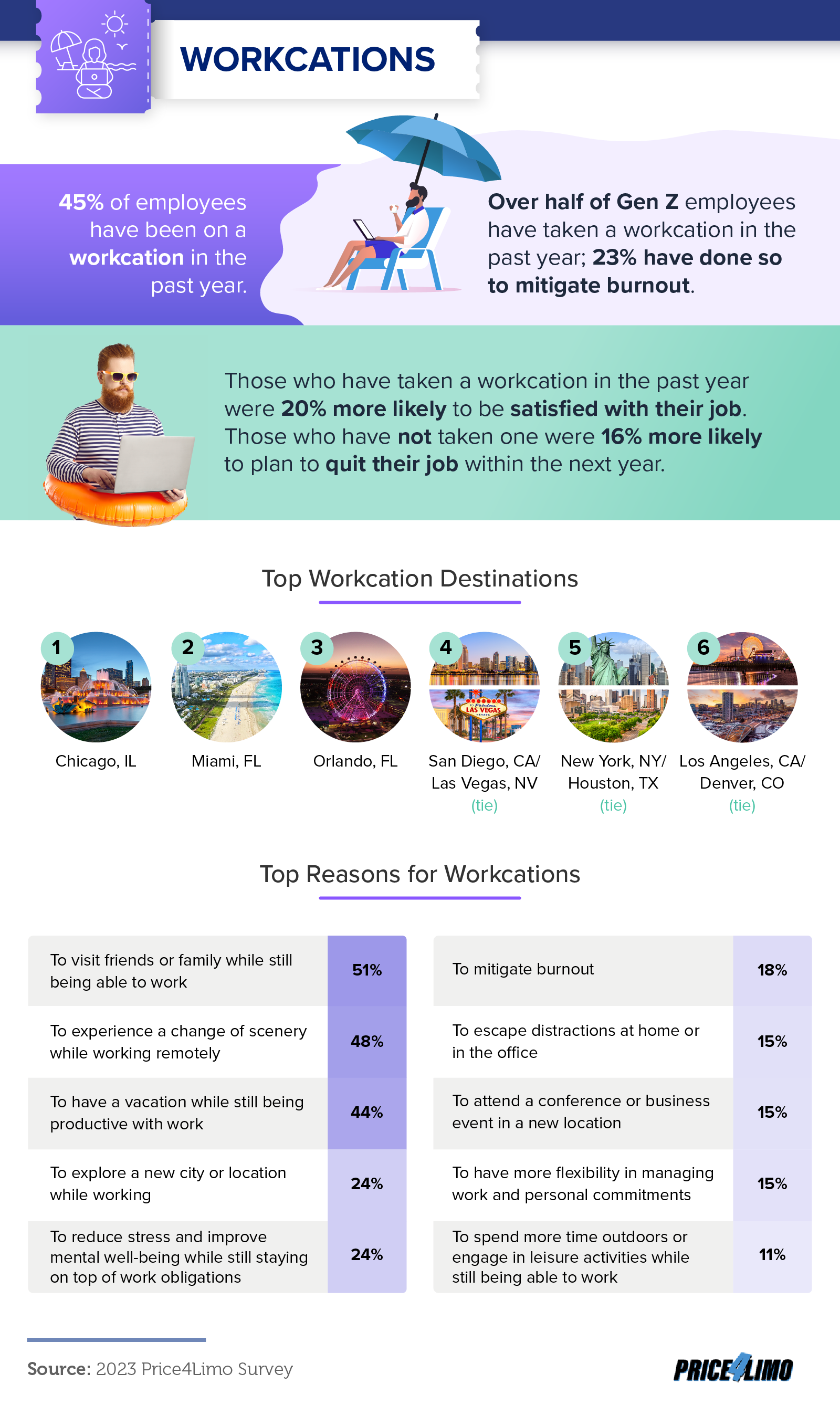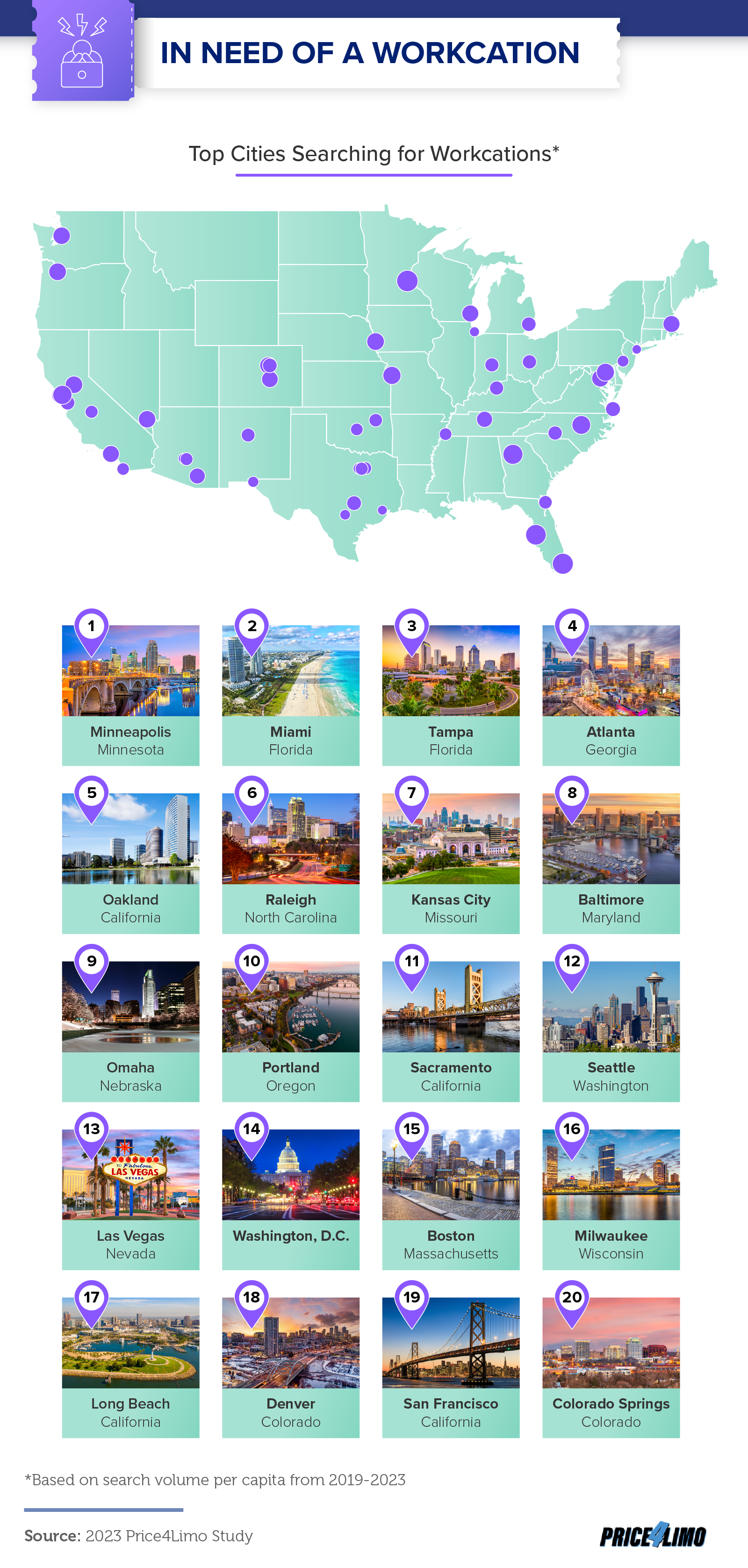Vacation in Disguise: The Growing Popularity of Workations and Hush Trips
Key Takeaways
- 45% of employees have taken a workcation in the past year.
- The top destinations for workcations are Chicago, Miami, and Orlando.
- 27% of workers who took a hush trip did so because they didn’t want to use their PTO/vacation days.
- Minneapolis, Miami, and Tampa are the top cities searching for “workcations” and “working vacations.”
Out of Office Not Required
We all appreciate a vacation where we can disconnect from responsibilities and unwind, but such time off isn’t always easy to come by. Some workers have limited or no paid time off, want to travel more, or don’t want to return to a pile of work. Enter the new trends of workcations and hush trips.
There’s no need for an “out of office” message when taking a workcation or hush trip. The idea behind both is that employees work remotely, but not from a home office or local coffee shop—from a vacation destination. It’s a growing trend among remote workers and can help employees improve their work-life balance and see the world without sacrificing a regular paycheck.
We recently surveyed 1,010 Americans who work full-time to find out who has jumped on the working vacation trend, where they’re going, and how much they’re spending to travel while on the job.
Workcations Are Trending
In an increasingly digital world, workcations offer an opportunity to combine work and leisure in a way that benefits both employees and their employers. How many workers are enjoying these trips, and what impact do they have on job performance?

With almost half of all respondents (45%) having taken a workcation in the past year, employees are taking full advantage of remote work. The top three reasons for taking a workcation were to visit family or friends, enjoy a change of scenery, and have a vacation while maintaining productivity at work. These priorities underscore Americans' desire for a better work-life balance.
There are many ideal workcation destinations across the U.S., but the top three destinations our respondents selected were Chicago, Miami, and Orlando. These cities are known for tourism and offer vibrant nightlife, making them ideal for exploration after work hours. If a remote job offers flexible hours in addition to flexible locations, employees can tailor a workcation to fit in the activities they enjoy most. Workers could sightsee in the morning and make up work time in the evening or work longer weekday hours to explore the area over an extended weekend.
Workcations offer obvious benefits for employees, but they also offer surprising benefits for employers. Employees who took a workcation were 20% more likely to feel satisfied with their jobs, and studies have shown that satisfied employees are more productive and motivated when at work. On the other hand, employees who had not taken a workcation were 16% more likely to want to quit their jobs in the next year, which is bad news for employers as low retention rates can hurt a business's bottom line.

Workcations can be a great solution for employees suffering from cabin fever, but hush trips are a bit riskier because employees take them without informing their bosses. There are many reasons employees might hazard a hush trip, but not wanting to burn vacation days was cited by 27% of survey respondents. When paid time off and vacation days are limited, relaxing vacations often get pushed aside for other priorities like family obligations and illness; it’s only natural that workers use unorthodox methods to get some real time away.
But many experts advise against hush trips and warn employees of potential repercussions should bosses find out, including loss of trust or even termination. When it comes to workcations employers know about, not all employers support working remotely from a vacation destination. Concerns include lack of focus or productivity when traveling, security concerns when using unsecured WiFi, and tax implications.
Searching for a Working Vacation
Reasons for taking a workcation or hush trip may vary, but how widespread is the desire to go? We examined search volume data from Google Trends over the past four years for the terms “workcations” and “working vacation” to determine which cities employees are most eager to get a break from.

Searches for workcation information were spread across metropolitan areas, with Minneapolis, Miami, and Tampa residents conducting the most searches. Many cities on the list are known for being tech hubs, and since tech jobs mostly consist of computer work that can be done remotely, it follows that these cities have high numbers of would-be workcationers.
One of the northernmost tech hubs and metro areas, Minneapolis had the highest rates of workcation searches. Employees there are likely eager to escape the cold, snowy winters. Minneapolis's airport averages more than 700 flights per day, making it easy to hop a flight to destinations across the U.S. and beyond.
According to our survey, Miami had the second highest number of searches for workcation information but was also a top workcation destination. It seems even employees living in hot vacation spots are eager to take advantage of the flexibility of remote work and enjoy a change of scenery.
Workcation and Hush Trip Costs
While travelers may still earn money during workcations, most vacations aren’t cheap. What’s the price tag for the average workcation? The amount our respondents have spent on these trips might surprise you.

On average, workcationers spent about $1,074 on these trips; baby boomers spent a few hundred dollars more, while Gen Zers spent a couple hundred less. Hush trips were slightly less expensive at an average of $808 per trip.
Across the board, accommodations were the biggest expense. If you’re looking to get away while still being able to work, some hotels and resorts, including the Four Seasons and Marriott Bonvoy, are now offering workcation packages. Packages include high-speed internet, dedicated workspaces, and on-site dining options to make the experience more comfortable, affordable, and productive.
Normalizing the Workcation Trend
Workcations have emerged as an ideal solution for employees seeking to break away from the monotony of their daily routine without compromising their professional commitments. Combining work with leisure has never been more appealing, and the flexibility of remote work makes it possible to get away and maintain a work-life balance. As remote work continues to grow in popularity, the workcation trend is likely to become even more prevalent. If you don’t want to miss out, you might want to make a workcation bucket list—and then get planning.
Methodology
Price4Limo surveyed 1,010 Americans who are currently employed full-time. Of these, 64 were baby boomers, 293 were Gen X, 591 were millennials, and 62 were Gen Z. Here’s how many respondents worked in each industry:
- Information technology: 202
- Health care: 126
- Education: 126
- Retail: 91
- Government: 58
- Manufacturing: 49
- Hospitality/food/beverage: 43
- Finance: 40
- Real estate: 25
- Transportation: 16
- Construction: 16
Search volume data was pulled from Google Trends on April 3, 2023, and encompasses searches for the phrases “workcation” and “working vacation” from 2019-2023, with the results for 2023 being predicted based on the existing data for the year.
About Price4Limo
Price 4 Limo is a nationwide marketplace where independently owned transportation companies compete for your business. In addition to our selection of thousands of limos, we also have access to the nation’s best charter bus rentals, mini bus rentals, and shuttle buses.
Fair Use Statement
Have a travel buddy in mind for your first workcation? Feel free to share this article for any non-commercial purpose; we just ask that you link back to this page so readers can have access to our full findings and methodology.
